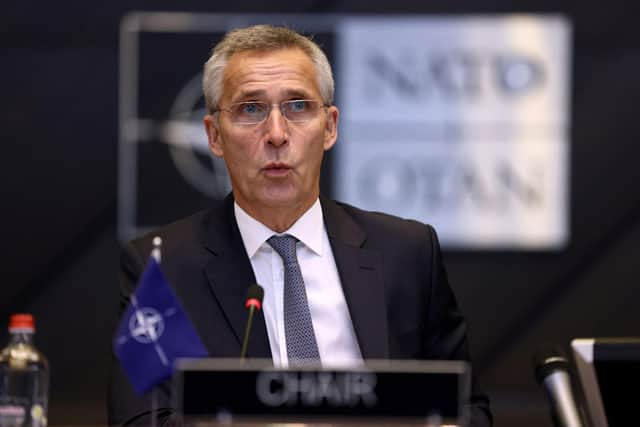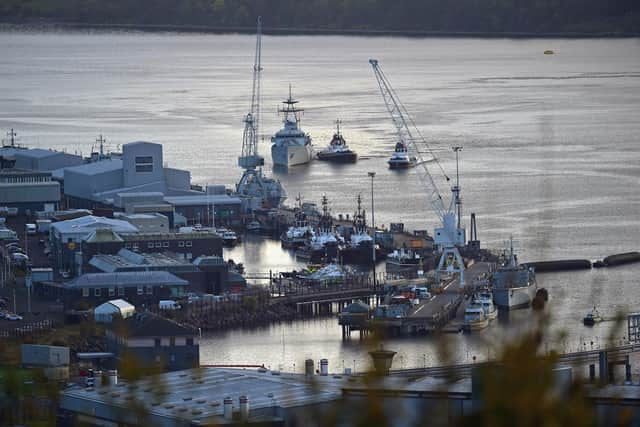COP26: NATO chief says it is up to UK to address Trident climate change flooding threat
Speaking to The Scotsman inside the COP26 blue zone, Jens Stoltenberg refused to be drawn into the debate over the long-term future of Trident on the Clyde, insisting that to do so would see him “dragged” into a discussion about Scottish independence.
A report issued in September by Dr Paul Dorfman, a former Ministry of Defence advisor who now chairs the Nuclear Consulting Group think-tank, warned the UK’s coastal military nuclear infrastructure was “profoundly vulnerable to flooding from sea level rise, storm intensity and storm surges”.
Advertisement
Hide AdAdvertisement
Hide AdIt stressed there were serious questions around the “operational viability” of Faslane, the port home to the UK’s four nuclear-powered Vanguard submarines, given projections of significant increases in annual flooding.
NATO’s own climate change plan, ratified earlier this summer, noted that sea level rises, extreme weather and rapid changes in precipitation patterns would “test the resilience of our military installations and critical infrastructure”.
Asked what NATO was doing to mitigate such threats, Mr Stoltenberg said: “What we see is that rising sea levels impact our naval bases and many of them are subject to regular flooding because of increased sea levels. This is, of course, the responsibility of each and every ally to adapt, to address the impacts of climate change.
“What we do at NATO is to raise awareness, to share best practices and information to help each other to adapt to everything and respond to increasing sea levels and more extreme, wetter, wilder and windier weather.”


He added: “This is a national responsibility. What NATO does is to raise awareness.
"It is the people who work there who are best placed to mitigate rising sea levels or other consequences. It is for the government and the authorities in the United Kingdom to make those decisions.”
The UK’s nuclear fleet has been based at Faslane since 1968, but amid the ongoing debate around Scotland’s political future, recent reports suggested the Ministry of Defence is drawing up a series of contingency plans which could see them moved to allied naval bases in the US and France. Other potential options include the designation of a British territory within an independent Scotland.
Asked whether NATO regarded any of those options as viable, given Trident represents a crucial pillar of its own defence infrastructure, Mr Stoltenberg declined to discuss the issue in any detail.


Advertisement
Hide AdAdvertisement
Hide Ad“It is not for me to comment on the issue of Scottish independence,” the 62-year-old said. “The United Kingdom is a highly valued NATO ally and I am not going to go into that discussion.”
Asked again how any plans to remove Trident from Faslane would impact on NATO’s defence capabilities, the former Norwegian prime minister replied: “I had the pleasure of visiting Faslane some years ago and it was an impressive facility.
"We saw the submarines and we saw the importance of the UK nuclear deterrent for NATO, but I will not go into discussions related to whether Scotland should remain part of the United Kingdom.”
Pressed on the fact the question was about the repercussions for NATO’s defence capabilities rather than Scotland’s constitutional future, he added: “If I start to comment on that, I will be dragged into the debate on Scottish independence.”
Mr Stoltenberg, a former United Nations special envoy on climate change, was more forthcoming on the wider threat posed by the climate emergency to NATO’s members and its operations.
“Climate change is a crisis multiplier,” he said.
“It is exacerbating conflicts around the world and it’s making the world more dangerous, therefore it matters for NATO. We see more competition over scarce resources and people are forced to flee their homes.
“For all this, NATO has to address climate change for security reasons, and we are doing that, not least through our climate change action plan which we agreed at our summit in June.”
Mr Stoltenberg said NATO’s response to the crisis took the form of increasing awareness, mitigation and adaptation.
Advertisement
Hide AdAdvertisement
Hide Ad“Increasing awareness means addressing the link between climate change and security, and we are developing annual assessments to fully analyse and understand the impact on security,” he explained.
“Mitigating is about introducing new, environmentally friendly technologies, but not in a way that undermines the strength of our armed forces. We cannot choose between green and strong armed forces. We need both of those things and it is absolutely possible to reconcile them.
“I’m absolutely certain that new technologies which we see being introduced in the civilian population will also be the most effective ones when it comes to providing power for ships and vehicles in the armed forces of the future.
“We are doing a lot with allies. The UK has introduced bio fuels and other renewable energy sources for aircraft and other vehicles, and the US and others are using more and more solar panels to provide power for bases and equipment.”
He went on: “Lastly, we need to adapt, because our armed forces are operating in more extreme weather and we need to be able to operate in them, like the extreme heat in Iraq, where soldiers are working in temperatures of more than 50C.
“The kind of missions you carry out and the equipment you use is impacted by that kind of extreme heat, and more and more our missions will be impacted by those conditions.”
A message from the editor:
Thank you for reading this article. We're more reliant on your support than ever as the shift in consumer habits brought about by coronavirus impacts our advertisers. If you haven't already, please consider supporting our trusted, fact-checked journalism by taking out a digital subscription.
Comments
Want to join the conversation? Please or to comment on this article.
